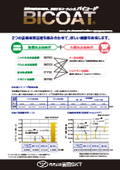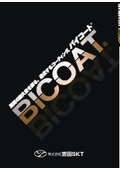[Case Study] Improvement of Mold Release for Molding Dies! Non-Stick Coating for Aluminum Molds
BICOAT
What is the coating used to release rubber products that tend to stick from molds? We will introduce case studies of solutions through the surface treatment of molding molds.
■Concern When molding rubber of different materials in layers, the products molded in the mold enter the vulcanization process while still in the shape of the mold. The products were made of materials that easily adhered to the mold, resulting in a phenomenon where they stuck to the mold and could not be removed after vulcanization. ■Background During demolding, strong forces are applied, so using standard fluororesin coatings posed a risk of peeling due to insufficient film strength. We recommended a Bi-Coat that excels in release properties and wear resistance, but the mold in question was made of soft aluminum and required surface treatment compatible with sulfur vulcanization, necessitating the selection of a Bi-Coat treatment that could adapt to both conditions. ■Coating Adopted Super Bi-Coat NYY-11-F05 ■Adoption Process and Effects We tested a Bi-Coat suitable for aluminum substrates and usable for sulfur vulcanization. Initially, demolding was good, but rubber adhesion began to occur within a short period. Therefore, we proposed and tested the "Super Bi-Coat NYY-11-F05," which excelled in release properties, achieving both initial demolding and sustained release properties. This led to its adoption. *Product data PDF is available for download.*
Inquire About This Product
Related Videos
basic information
"Bycoat(R)" is a system that achieves the ideal functions of "lubrication + release + wear resistance" by combining inorganic and organic surface treatment technologies. It withstands harsh usage areas such as injection molds, providing reliable lubrication and release properties. Additionally, due to its excellent dimensional accuracy, it is suitable for areas requiring micron-level precision. 【Features】 ■ Incredible durability ■ High hardness and resistant to scratches ■ Excellent wear resistance ■ Outstanding non-stick and release properties ■ Safe to use in molds requiring micron-level dimensional accuracy *For more details, please refer to the PDF document or feel free to contact us.
Price range
Delivery Time
Applications/Examples of results
【Applications】 ■ Rubber injection molding molds ■ Molds requiring dimensional accuracy for release ■ Parts requiring wear resistance and slippage ■ Parts requiring wear resistance and non-stick properties ■ Release of adhesives and sticky materials ■ Guide components for packaging machine conveyor sections
catalog(3)
Download All Catalogs

Company information
To maximize the performance of manufacturing equipment and machine parts, Yoshida SKT derives the "optimal solution" tailored to our customers from hundreds of surface treatment technologies. - Decreased productivity due to adhesive troubles - Instability in product quality due to friction - Early deterioration of equipment due to corrosion We respond to these challenges in the manufacturing field with our extensive track record and reliable technical expertise. In 1963, we began fluoropolymer processing. In 1968, we signed a licensing agreement with DuPont (now Chemours), supporting manufacturing innovations for over 2,000 customers across various industries, from automotive to medical and aerospace. Furthermore, in 2024, we are focusing on the development of next-generation products, such as PFAS-free coatings, contributing to the advancement of sustainable manufacturing. With a three-base system in Nagoya, Tokyo, and Yamaguchi, we flexibly respond to both mass production and custom orders. Our consistent quality management system ensures that we deliver reliable quality. For solving challenges in the manufacturing field, trust the surface treatment experts at Yoshida SKT.




![[Case Study] Surface Treatment to Enhance Release Properties of Biodegradable Plastic Molding Dies](https://image.mono.ipros.com/public/product/image/bd1/2000778160/IPROS21784532298946854955.jpeg?w=280&h=280)


![[Case Study] Coating that extends the lifespan of polypropylene heat-welded sheets by five times.](https://image.mono.ipros.com/public/product/image/e6e/2000743712/IPROS35685979426840845040.png?w=280&h=280)
![[Case Study] Unable to manage the dimensions and shapes of parts that undergo surface treatment.](https://image.mono.ipros.com/public/product/image/2068203/IPROS7764406603704587704.png?w=280&h=280)

